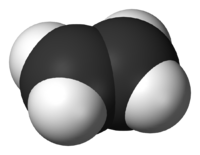
Photo from wikipedia
The role of alcohol in the Yb(OTf)3- and Y(OTf)3-catalyzed stereoselective radical polymerization of acrylamides is clarified. The coordination of an alcohol to the metal triflate generates a new complex, which… Click to show full abstract
The role of alcohol in the Yb(OTf)3- and Y(OTf)3-catalyzed stereoselective radical polymerization of acrylamides is clarified. The coordination of an alcohol to the metal triflate generates a new complex, which increases both the polymerization rate and stereocontrol compared to those achieved by the metal triflate without an alcohol in the polymerization of N,N-diethylacrylamide. While the lanthanide triflate-catalyzed stereoselective polymerization of acrylamides in MeOH has already been well established synthetically, this is the first example that proves the formation of an alcohol-coordinated catalyst as the active catalyst. Job’s plot suggests that the stoichiometry between Yb(OTf)3 and MeOH in the complex is 1:2. The polymerization rate decreases slightly when MeOD is used instead of MeOH, with a secondary isotope effect of 1.14, strongly suggesting the importance of hydroxyl groups for increasing the reactivity. In contrast, no apparent secondary isotope effect is observed to affect the stereoselectivity. The chirality of the alcohol ligand does not affect the stereoselectivity, illustrating that the stereochemistry is most likely controlled by the penultimate effect, which has already been proposed. Furthermore, the conditions are highly compatible with those for organotellurium-mediated radical polymerization, and the dual control of molecular weight and tacticity is successfully achieved. The role of alcohol in the Yb(OTf)3- and Y(OTf)3-catalyzed stereoselective radical polymerization of acrylamides is clarified. The coordination of two equivalents of alcohol to the metal triflate generates a complex, which increases both the polymerization rate and stereocontrol compared to those without an alcohol. The importance of hydroxyl groups of the alcohol is suggested by the observed secondary isotope effect for the rate enhancement. The conditions are highly compatible with those for organotellurium-mediated radical polymerization, and the dual control of molecular weight and tacticity is successfully achieved.
Journal Title: Polymer Journal
Year Published: 2020
Link to full text (if available)
Share on Social Media: Sign Up to like & get
recommendations!